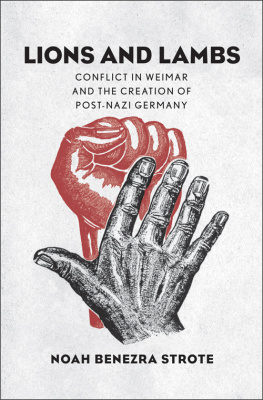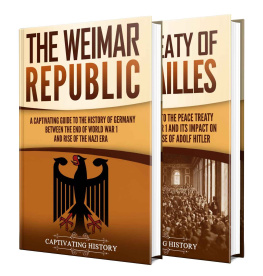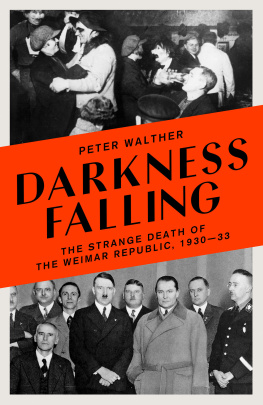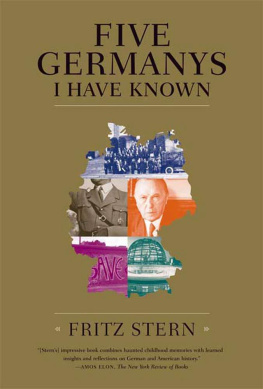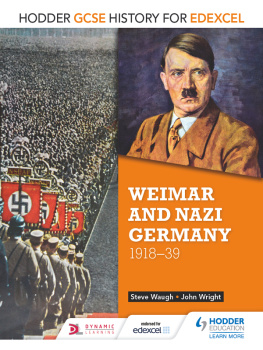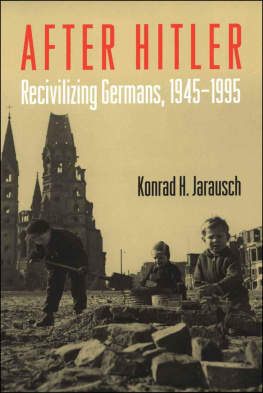LIONS AND LAMBS

Copyright 2017 by Noah Benezra Strote.
All rights reserved.
This book may not be reproduced, in whole or in part, including illustrations, in any form (beyond that copying permitted by Sections 107 and 108 of the U.S. Copyright Law and except by reviewers for the public press), without written permission from the publishers.
Yale University Press books may be purchased in quantity for educational, business, or promotional use. For information, please e-mail (U.K. office).
Set in Scala and Scala Sans type by IDS Infotech Ltd.
Printed in the United States of America.
ISBN 978-0-300-21905-0
Library of Congress Control Number: 2016956973
A catalogue record for this book is available from the British Library.
This paper meets the requirements of ANSI/NISO Z39.48-1992 (Permanence of Paper).
10 9 8 7 6 5 4 3 2 1
Certainly we have not, overnight, become completely different people because of the war, so that for instance the lions and the lambs among us can wander next to each other peacefully.
Friedrich Meinecke, politician and professor of history at the University of Berlin, 1917
CONTENTS
ACKNOWLEDGMENTS
Many different people contributed to the labor that went into the production of this book, and it gives me special pleasure to acknowledge them here.
First and foremost, the editors with whom I worked at Yale University PressErica Hanson, Phillip King, and Chris Rogershave my unending thanks for their enthusiasm as they prepared the project for publication. The suggestions that they and two anonymous reviewers made after reading the original manuscript sharpened the final product in key ways.
Special thanks are due to colleagues and friends in the place I have called home for the past five years. The faculty of the History Department at North Carolina State University, and in particular Steven Vincent, David Zonderman, and the dearly missed Jonathan Ocko, created the conditions in which a junior scholar could thrive. I can barely imagine now not having met Judy Kertsz, whose friendship has been of incalculable importance. Coming here also brought me into the orbit of powerful minds in the Triangle Intellectual History Seminar, a group that in my experience approaches the ideal of a scholarly community. Tony LaVopa, Malachi Hacohen, Emily Levine, and James Chappel took a special interest in my work and generously shared of their time, knowledge, and wisdom. The North Carolina German Studies Seminar, led by Konrad Jarausch and Karen Hagemann in a space called the Incubator Room at UNC Chapel Hill, provided a fertile environment for cultivating my arguments about modern German history.
This project would not have been thinkable without the masters of the historical craft under whom I was lucky enough to study. The books structure, with its dialectical pairs, owes much to the influence of Martin Jay, who directed my dissertation at Berkeley. The late Gerald Feldman taught me respect for the archival document. John Connelly reminded me to build the sustained argument in all its necessary twists and turns. John Efron brought me back to the big story. Peggy Anderson showed me the pedagogical power of vivid narration. Before graduate school, it was Yosef Hayim Yerushalmis lectures on antisemitism and Simon Schamas seminar on writing narrative history at Columbia University that inspired me to consider this as a profession. Samuel Moyn and Michael Stanislawski provided encouragement while also dutifully warning me about the difficulties of life in academia.
At the end of the day, my friends proved to be my most helpful critics and advisers as I conceived, researched, and wrote this project over almost ten years and in multiple cities. At the top of the list by far is Eliyahu Stern, who read almost every sentence of the manuscript in its various versions and counseled me faithfully on all matters large and small over home-cooked meals and countless phone calls. Elli often intuited what I was trying to do well before I understood it myself, and his edits pushed me toward what I now consider my most important insights. Another dear comrade, Zvi Septimus, helped me realize that much of my dissertation had to be scrapped before it could become the book it is now. In the Bay Area, Amos Bitzan, Grahame Foreman, Shaun Halper, and Will Schachterle were my lifelines. In New York, Louis Abelman and David Moore were there when I first began thinking about postwar Germany as a topic of research and kindly dedicated precious shelf space in their Brooklyn apartment to bulky books on Nazism. I am grateful for the intellectual companionship of Gideon Lewis-Kraus in Berlin, Ben Letzler in Munich, Julia Creet, Samuel Goldman, and Ari Joskowicz in Washington, D.C., and Steve Milder in the Research Triangle. My oldest and most loyal friends, Karthik Pandian and Shiben Banerji, helped me with some tricky problems of language as I put the finishing touches on the manuscript.
Researchers incur many unrepayable debts to librarians and archivists, whose assistance in producing a book too often goes unacknowledged. I would like to thank the staff at the Staatsbibliothek Preussischer Kulturbesitz, the Archiv am Institut fr Wirtschaftspolitik, the Historisches Archiv des Erzbistums Kln, the Archiv fr Christlich-Demokratische Politik, the Bundesarchiv in Koblenz, the Ludwig-Erhard-Stiftung in Bonn, the Deutsches Exilarchiv, the Institut fr Sozialforschung-Archiv, the Archiv des Instituts fr Zeitgeschichte, the Deutsches Literaturarchiv Marbach, the Archives of the Wisconsin Historical Society, the Hoover Institution Archives, and the special collections departments of the libraries at the University of Groningen, the University of Chicago, Temple University, Georgetown University, and the University at Albany-SUNY. Special thanks are due to Christian Mller, who helped me with the papers of Wilhelm Rpke in Cologne; to Stephen Roeper, who treated me to coffee at the Frankfurt University Library as we discussed German politics and the legacy of Max Horkheimer; and to Tonnis Musschenga, whose staff patiently scanned hundreds of letters to and from Helmuth Plessner. The interlibrary loan office at D. H. Hill Library at North Carolina State procured obscure books from all over the world, free of charge.
During my research in Germany, I communicated with many people who personally knew the figures I write about in this book, and who patiently answered the often naive questions of a young American. I owe an enormous debt of gratitude to Julius Schoeps, Marianne Leibholz, Erika Bergstraesser, and Balthasar Benz, who granted me access to the literary estates of their fathers. Balthasar Benz deserves further mention for hosting me graciously in Marburg, where we unearthed his fathers papers in a musty abandoned garage. I would also like to thank Karl Dietrich Bracher, Jrgen Habermas, Detlev Claussen, Mario Kessler, Alfons Sllner, Yael Geis, Ludwig von Friedeburg, Axel Honneth, and Alfred Schmidt for meeting and corresponding with me in the beginning stages of the project when my ideas were still embarrassingly inchoate.
Numerous people read individual parts of the book in their more awkward stages of construction and pointed me to important source material. Thank you to Carl Caldwell, Dick Buxbaum, Bill Patch, Udi Greenberg, Dirk Moses, Eric Oberle, Erich Geldbach, Daniel Bessner, and David Kettler for their critical feedback. Thank you as well to Spiros Semitis, Bernhard Emunds, Jonas Hagedorn, Carola Dietze, Douglas Morris, Jan-Werner Mller, Michael Brenner, Stefan Mller-Doohm, Detlef Lehnert, Atina Grossmann, Martin Otto, Hans Jrg Hennecke, Michael Grttner, Wolfgang Schrder, Matthias Mhring-Hesse, Gnter Behrmann, Raphael Gross, Susannah Heschel, Stefan Vogt, Martin Treml, Stephanie Zibell, Anthony Kauders, Tobias Freimller, Hubertus Buchstein, and Donald Kommers for their help with sources.
Next page
